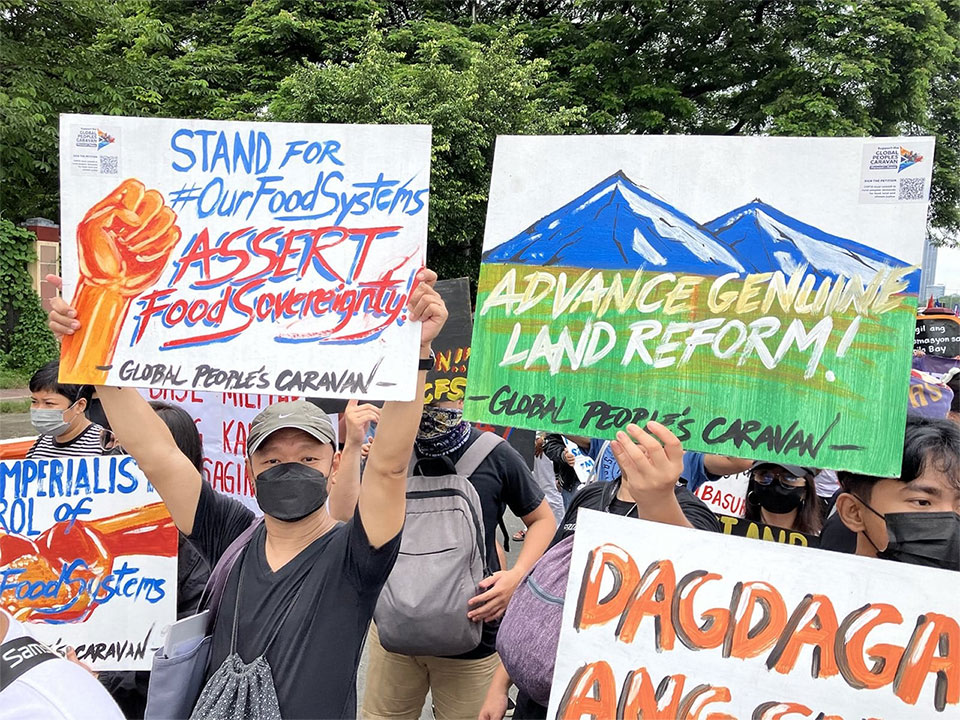Rural peoples and advocates across the globe warned that world hunger and interlinked food, human rights and climate crises will worsen as big corporations consolidate their control over the world food systems through the UN Food Systems Summit +2 (UNFSS), being held in Rome from July 24 to 26.
In a unity statement released during a Global Day of Action, 49 organizations from 22 countries–representing tens of thousands of small farmers, landless peasants, pastoralists, fisherfolk and their advocates–said that the UNFSS +2 forwards “the agenda and interests of global monopoly corporations in agribusiness, agrochemicals, technology, finance, etc. They have been using various institutions in research, philanthropy, development work and civil society – many of which the corporations set up – and conspiring with UN food and agriculture agencies and other multilateral institutions to sell their grand deception of food systems change through so-called multistakeholderism.” According to the groups, multistakeholderism allows the private sector a much bigger space in decision-making and legitimizes “pathways, programs and policies that promote neoliberal reforms” which further tighten the grip of transnational corporations (TNCs) over national and local food systems.

Public-private partnerships, reducing trade barriers and protectionism, and attracting private finance are some of the main features of the national pathways identified by countries at the behest of the UN Food Systems Coordination Hub. Rural peoples demand prioritizing genuine land reform, dismantling corporate monopolies in food and agriculture, and strengthening government support for community-led, agroecological production for domestic needs to alleviate hunger and avert climate catastrophe. On the contrary, the UNFSS + 2 highlights “the role that international trade can play in promoting improved nutrition and sustainable food systems,” and paves the way for increased financialization of food systems–despite the fact that financial asset firms, banks, and speculators controlling global food markets are responsible for unprecedented food inflation in many countries, especially food-importing nations.
A look at the Food Systems Coalitions that the UNFSS has identified as movers for so-called food systems transformation reveals the presence of food and agriculture TNCs, which have been historically responsible for greenhouse gas emissions, land grabbing, plunder of natural resources, profiteering from seeds and harmful agrochemicals, and colonizing domestic markets in the Global South. Through the UNFSS, “food systems transformation” has become the latest byword for these corporate ‘greenwashing,’ or using the climate crisis to extract superprofits further.

For instance, in these Food Systems Coalitions, the World Economic Forum is involved in “nature-positive production” and “digital food systems,” the Gates-funded Global Alliance on Food and Nutrition and CGIAR in nutrition and healthy diets, corporate-funded and landgrabbing-linked The Nature Conservancy in “land and freshwater,” giant fast food chains such as McDonald’s and Burger King through the Sustainable Beef Roundtable in “sustainable pastoralism,” pesticide and fertilizer giants from CropLife and International Fertilizer Association in “soil health” through the Coalition for Soil Health, and so on.
“Amid the global hunger and climate crises, imperialist countries and big corporations are rushing to deepen their control and further squeeze profits from global food systems through financialization and the neoliberal fine-tuning of our food systems and agriculture, as well as the introduction of more harmful technologies,” said Sarojeni Rengam, executive director of PAN Asia Pacific (PANAP).

“Evidently, TNCs and their proponents have long dominated this platform, showing no willingness to address underlying structural causes of hunger. Food price inflation, coupled with a significant decline in income and lack of access to production inputs like land and seeds, remains unaddressed. Despite claims made by the Rome-based summit, the pursuit of profits for the summit’s financiers seems to take precedence, potentially resulting in even higher food prices and the depletion of production resources. This leads to environmental and climatic disasters, as well as the destruction of local agricultural systems and thus entire economies,” said Razan Zuayter, global co-chair of the People’s Coalition for Food Sovereignty (PCFS).
In 2022, up to 783 million people suffered from chronic hunger. “Hunger and poverty figures are record-high, and the trend continues to rise. Imperialism, including its domination over our food systems and agriculture, depletes the life of the poor and hungry, especially in the Global South. The people’s only recourse is to resist,” said Liza Maza, general secretary of the International League of Peoples’ Struggle (ILPS).

“The neoliberal food systems transformation being facilitated by the UN has done so little, nor has it provided any clear direction towards recognizing the right to land and self-determination. It seems as if our persistence to struggle for land and self-determination poses a threat to the corporate agenda of the UNFSS,” said Beverly Longid, coordinator of Indigenous Peoples Movement for Self-Determination and Liberation (IPMSDL).
“Peasant movements are the real levers of food systems transformation. More than token participation in the corporate-led UNFSS, what we need are radical policy changes. This can only be achieved by supporting and strengthening rural communities as they push back to regain control over #OurFoodSystems,” said P. Chennaiah, chairperson of the Asian Peasant Coalition.

In the build-up to the UNFSS +2, rural peoples held community consultations and protest actions across the globe as part of the Global People’s Caravan for Food, Land and Climate Justice (GPC). A continuation of the Global People’s Summit for Just, Equitable, Healthy, and Sustainable Food Systems, or the Global South-led counter-summit to the first UNFSS in 2021, the GPC aims to mobilize tens of thousands of rural peoples to assert genuine food systems transformation through its 4 Pillars: 1) People’s Food Sovereignty; 2) Peasants Rights to Land and Resources; 3) Right to Adequate, Affordable, Healthy and Culturally-Appropriate Food; and 4) People-Led Agroecology. The Global People’s Caravan aims to bring the demands of rural peoples to the UNFCCC COP in Dubai this year, and the UN Summit of the Future in New York in 2024.








Discussion about this post